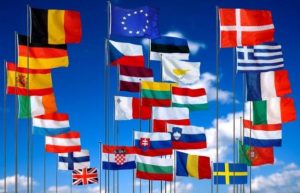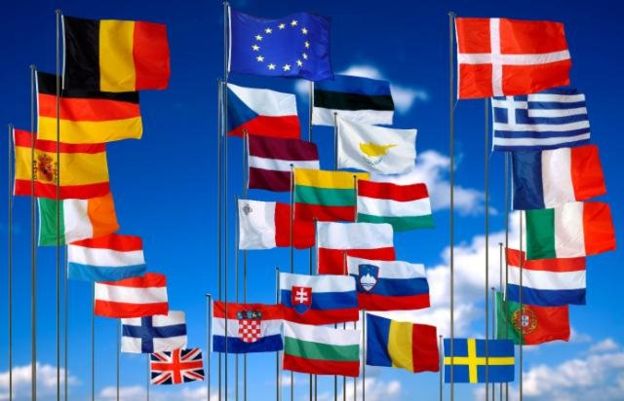
Blockchain is best known as the foundation for Bitcoin and other cyptocurrencies, but the distributed ledger technology could be deployed in a vast array of applications, including at government level.
Governments around the world are investigating the benefits of putting public services on distributed ledgers to create new systems for everything from health records, voting, taxation, welfare payments, to engagement with citizens and digital currencies.
Here we look at some governments that have launched blockchain projects already.
How can governments use blockchain to build better public services?
1. The European Union
The European Union Intellectual Property Office (EUIPO) is investigating how blockchain could combat counterfeiting, which costs the EU €60 billion (£53.5 billion) each year according to the agency’s research.
In June, the EUIPO and the European Commision organised a “Blockathon” competition in Brussels, where 11 teams of coders created a series of anti-counterfeiting blockchain solutions, drawing on support from specialists in law, IP and anti-counterfeiting.
Team Cryptomice won the overall prize for creating a “virtual twin” that cannot be copied and is sent to consumers for verification before they receive the connected physical product, which is registered on a blockchain.
EUIPO spokesperson and former IP lawyer Luis Berenguer Giménez told Computerworld UKthat the agency was now in negotiations with private sector companies to turn the ideas into working products.
“The overall objective is to have a good app or product based on blockchain that can stop or at least diminish the amount of counterfeited products that we have nowadays in the EU,” he said.
2. Estonia
Blockchain provides the backbone of the renowned e-Estonia programme, which connects government services in a single digital platform. The project integrates a vast quantity of sensitive data from healthcare, the judiciary, legislature, security and commercial code registries, which are stored on a blockchain ledger to protect them from corruption and misuse.
Estonia began testing distributed ledger technology in 2008, before the Bitcoin white paper that first coined the term “blockchain” had been published. Estonia dubbed the technology “hash-linked time-stamping” at the time.
The Baltic state went on to develop a blockchain technology called KSI, which secures the country’s networks, systems and data. The KSI system provides a formally verifiable security system for the government that can function even under constant cyber-attack, and is now available in more than 180 countries.
3. USA
The USA is exploring a number of distributed ledger applications. In January 2017, the Food and Drug Administration (FDA) announced it had signed a two-year joint-development agreement with IBM Watson Health to explore using blockchain to securely share patient data. The collaboration aims to address the lack of transparency and security in health data processing and began with a trial on oncology-related data.
Then, in June 2018, the Trump government announced a very different blockchain trial. The Department of Homeland Security (DHS) awarded a grant of $192,380 to a startup called Factom to test the capability of blockchain to protect data collected by Border Patrol cameras and sensors.
4. Denmark
In 2014, Danish political party the Liberal Alliance became the first major political party in the world to vote using blockchain technology.
The party forms part of a three-party coalition government in Denmark, and continues to use blockchain to power the internal election it holds at its annual meeting in a suburb of Copenhagen.
5. Dubai
By 2020, Dubai wants to become the first government in the world to conduct all of its transactions using blockchain.
The emirate estimates that adding visa applications, bill payments, license renewals and other documents to a blockchain could save 5.5 billion dirham (£1.1 billion) annually in document processing alone. It could also cut CO2 emissions by up to 114 MTons due to trip reductions and redistribute up to 25.1 million hours of economic productivity.
6. Switzerland
The Swiss city of Zug is one of Europe’s leading supporters of blockchain. Zug already accepts cryptocurrency as payment for public services, has digitised ID registrations built on the blockchain, and recently completed an e-voting trial.
Zug partnered with Lucerne University of Applied Sciences and software company Luxoft to create the customisable blockchain-based e-Vote system, which is integrated with Zug’s Ethereum-based digital ID registration application. Votes are anonymised and tamper-proof, and the system is deployed in three different data centres, which distributes security and data loss risks geographically.
Luxoft will open source the platform and is establishing a Blockchain for Government Alliance to promote blockchain use cases in public institutions.
7. Isle of Man
The Isle of Man is using blockchain to protect its thriving e-gaming sector from fraud. In August 2017, the British Crown dependency granted the world’s first reputable licence for a blockchain lottery to gambling company Qanta, which will operate a system built on Ethereum technology. The lottery will be drawn using a decentralised number generator. Tickets will be sold through smart contracts and prizes paid out in cryptocurency.
Brian Donegan, head of e-business operations for the Isle of Man Government, told Computerworld UK that blockchain will reduce the risk of fraud in the sector.
“The immutability and the censorship resistance that is offered by blockchain technology is such that we can use blockchain to keep crime out and protect the consumer,” he said.
8. Georgia
Georgia’s government has experimented with blockchain in a land registry project developed with the Bitfury Group, dubbed the National Agency of Public Registry (NAPR).
“The Bitfury Group and NAPR implemented a custom-designed blockchain system that is now integrated into the digital records system of NAPR,” Willem-Jan Bruin, the director for Western European blockchain-based solutions at BitFury Group, told Computerworld UK.
“This private, permissioned blockchain is anchored to the Bitcoin blockchain through a distributed digital timestamping service. Distributed digital timestamping allows NAPR to verify and sign a document containing a citizen’s essential information and proof of ownership of property.
“The importance and disruptive potential of the project lies in its ability to make land titles – and, in general, property rights – available to billions of people who are currently unable to legally register their property. Blockchain technology also permits significant time and cost savings in the registration process. Therefore, the blockchain land-titling project could have a big global impact beyond Georgia.”
9. Gibraltar
Gibraltar launched Europe’s first regulated bitcoin product in 2016, when the Gibraltar Stock Exchange (GSX) unveiled a cryptocurrency called BitcoinETI. The British overseas territory has also introduced a bespoke license for fintech firms using blockchain, and created a blockchain subsidiary of its stock exchange.
In February 2018, the Gibraltar Blockchain Exchange (GBX) announced the completion of its first token sale, which was issued in the Rock Token (RKT) cryptocurrency. A total of 60 million RKT was distributed in the public token sale, the equivalent of £4.5 billion.

























